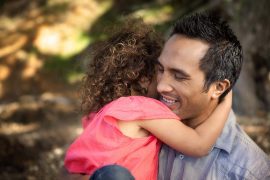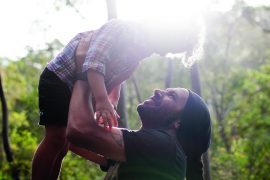DO’S AND DON’TS OF RISKY PLAY
Don’t help your child. OK, OK, I know that sounds heartless, but hear me out. If you help your child up the tree, they aren’t doing it themselves. There is no sense of accomplishment for them and it can potentially be dangerous. If they can’t climb the tree, then that means they shouldn’t be up there!
- Don’t force your child to participate in risky play. Each child knows their limits and you should respect them.
- Don’t say “Be careful.” My go-to phrase is, “Are you feeling safe? What is your plan?” If they can tell me what their plan is, I know that they are thinking critically about their decisions. They are more “present” in their play, which will prevent injury. Amanda, from Hike it Baby Park City, UT, reminds her child to “trust your body.” Teaching a child to listen to his body is an invaluable skill as he gets older!
- Don’t panic. It can be scary to watch your child participate in dangerous activities. Your heart races and you feel nervous. You start to think of all the horrible things that are going to happen and how much the hospital bill will be. Children will feed off of that energy. If you are scared, they will then believe that what they are doing is scary and, as a result, panic, as well.
- Don’t come to your child’s rescue if they are “stuck.” I’m such a mean mom, right? If your child is stuck, your first reaction will likely be to swoop in and rescue them. Instead, talk them through it. Did they climb up a play structure and they can’t get down? Talk them through it: “It looks like you’re scared. Let me help you. Put your foot there. OK, now put your hand there. You can do it.”
- Don’t let the “haters” discourage you. It can be frustrating when a stranger on the playground helps your child off the play structure, or when they tell you that your 2-year-old is climbing up a ladder (yeah, I know, lady, I’m sitting here watching him), but take it as an opportunity to educate people on risky play. Tell them that you trust your child’s decisions and that they know their limits better than anyone else.
- Do be present. Talk them through their play if there is an exceptional risk. Make them aware of what they are doing. “You are up there so high! You are so brave. I see you stepping so carefully.”
- Do expose your child to risky play opportunities frequently. Even if they don’t take to risky play right away, it’s important to expose them to the opportunity. You never know when they will finally be ready to tackle those monkey bars!
- Do allow children to play with sticks. Sticks are my 10-month-old’s favorite toy. (Don’t worry, they don’t have sharp ends, so they are not a hazard.) Sticks can be anything. It can be a wand, it can be a log, it can be a chew toy, it can be a writing utensil, it can be a tool. Sticks open up a child’s imagination!
- Do allow your child to go up the slide. This may be an unpopular statement, but I assure you, it’s actually good for kids – taking turns, communication (“Is anyone at the top? I want to climb up!), and using a new set of muscles. (But do make sure they aren’t preventing other kids from sliding down.) Don’t take fun and adventure away at the playground!
- Do allow your child to explore on their own. Be close enough to talk to them, but don’t follow too closely. This will create more independence and self-confidence in their ability to participate in risky play opportunities.
- Do allow them to fail. Failing is how children learn! It’s OK if they get “stuck” in the tree. It’s OK if they fall of the log while they are balancing. And, above all else, don’t panic if they do!
- Do trust your child. They know their limits. If they weren’t ready for something, they wouldn’t do it.
I realize that risky play may not be for every family. However, in my decade of working in early childhood education, I have seen many more benefits than disadvantages of risky play. I’ve seen shy children come out of their shell when they finally tackled something they were too scared to do. I’ve seen childhood friendships develop by just building a fort. And I’ve seen my own son’s self-confidence soar over the years as he tackled more challenging activities. We’ve always allowed him to be his authentic Wild Child Self, and you know what? We’ve never been to the emergency room (*knock on wood*!).
Originally published HERE.
Annie Fortunato lives in Ann Arbor, Michigan, and grew up with a plethora of outdoor opportunities and shares her love of the outdoors and nature with her sons, Neko and Levi. When they aren’t on the trails, they enjoy traveling, camping and kayaking with her husband, Mike. Being outdoors is where she feels the most at “home” and she loves getting the opportunity to share it with others – especially children!










